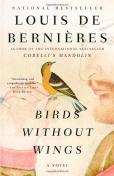BKMT READING GUIDES
Birds Without Wings
by Louis de Bernieres
Paperback : 576 pages
4 clubs reading this now
2 members have read this book
Introduction
In his first novel since Corelli’s Mandolin, Louis de Bernières creates a world, populates it with characters as real as our best friends, and launches it into the maelstrom of twentieth-century history. The setting is a small village in southwestern Anatolia in the waning years of the Ottoman Empire. Everyone there speaks Turkish, though they write it in Greek letters. It’s a place that has room for a professional blasphemer; where a brokenhearted aga finds solace in the arms of a Circassian courtesan who isn’t Circassian at all; where a beautiful Christian girl named Philothei is engaged to a Muslim boy named Ibrahim. But all of this will change when Turkey enters the modern world. Epic in sweep, intoxicating in its sensual detail, Birds Without Wings is an enchantment.
Excerpt
Editor's Note: At this point in the novel, Yusuf's daughter is pregnant by a Christian, leaving him with only one, terrible course of action...The Tyranny of Honour
Yusuf the Tall loved all his children equally, with a passionate adoration that, when he thought about it, sometimes made him lachrymose. If his life were like a garden, then his daughters would be like the roses growing alongside its walls, and his sons would be like young trees that formed a palisade against the world. When they were small he devoted happy hours to their entertainment, and when they grew older he hugged them until their eyes bulged and they thought that their ribs would crack. He had grown to love his wife too, partly because this is what happens when a wife is well chosen, and partly because from her loins had sprung these brooks and becks of happiness. ...
Discussion Questions
From the Publisher:1. Why has Louis de Bernières chosen Birds Without Wings as his title? What actual and symbolic roles do birds play in the book? What does Karatavuk mean when he writes at the end of the novel, “We were birds without wings. . . . Because we cannot fly we are condemned to do things that do not agree with us” [p. 550–551]?
2. The setting of Birds Without Wings is an early twentieth-century Turkish village. How, despite its distant setting, does the novel mirror the contemporary world? In what way is the world of the novel vastly different from the world today?
3. In his prologue, Iskander the Potter says that he misses the Christians after they were removed from Eskibahçe: “Without them our life has less variety, and we are forgetting how to look at others and see ourselves” [p. 7]. Why does he feel that the presence of “others” allowed the villagers to see themselves? Why is the loss of variety so important? Why were so many different kinds of people able to live together in Eskibahçe so peacefully?
4. What makes Eskibahçe such a marvelously colorful village? Who are some of its most eccentric and engaging characters? How does the village change over the course of the novel?
5. The novel vividly describes the nationalist fervor that swept the world in the early twentieth century: “Serbia for the Serbs, Bulgaria for the Bulgarians, Greece for the Greeks, Turks and Jews out!” [p. 16] What causes these feelings? What are their ultimate consequences?
6. After Ayse and Polyxeni convince the reluctant Daskalos Leonidas to write a message in tears on the wings of a dove, which they hope will fly to Polyxeni’s dead mother, Ayse exclaims, “It’s incredible! A man with that much education, and he didn’t even know about how to get a message to the dead” [p. 77]. What does this scene suggest about the gulf between traditional and modern ways of understanding the world?
7. On the way to Smyrna, Iskander prefaces his story by saying, “The thing about stories is that they are like bindweeds that have to wind round and round and creep all over the place before they get to the top of the pole” [p. 128]. Is what Iskander says here true of the novel itself? How does the story line “creep all over the place”?
8. What kind of man is Mustafa Kemal? How does he achieve his great military success? What are the ultimate consequences of his actions?
9. Leyla tells Rustem Bey that the women in town are saying he is a bad master because he doesn’t beat her [p. 228]. What does this passage suggest about the relationship between women and men in the novel? What roles are women expected to play? In what ways are they oppressed by their culture?
10. What are the most horrific aspects of war as they are described in Birds Without Wings? What are its greatest cruelties? What surprising acts of compassion do the soldiers perform for one another and even for their enemies? How does war affect the village of Eskibahçe?
11. Why does de Bernières use different narrators and different points of view in the novel? Does this multiplicity of voices mirror some of the novel’s main themes?
12. What is the significance of the relationships between Philothei and Ibrahim and between Karatavuk and Mehmetçik? Why are these young people so drawn to each other despite their religious differences?
13. Can Birds Without Wings be read as a cautionary tale for our own times? What does the novel say about the larger themes of love and war, revenge and forgiveness, both toward oneself and others?
Book Club Recommendations
Recommended to book clubs by 0 of 0 members.
Book Club HQ to over 90,000+ book clubs and ready to welcome yours.
Get free weekly updates on top club picks, book giveaways, author events and more








